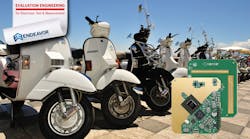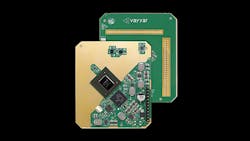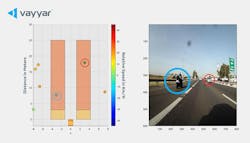Sensor Tech Serves Robots, Motorcycle/Scooter Safety
This article appeared in Evaluation Engineering and has been published here with permission.
Boston-based Piaggio Fast Forward developed sensor technology for implementation in applications spaces such as consumer and business robots as well as scooters and motorcycles. Last year the company began developing a custom radar sensor module for use motorcycles and scooters, initially for their own products, but eventually expanding to providing the technology to other companies.
The modules provide robust monitoring in all environmental and lighting conditions, with the modules’ radar-on-rhip (RoC) coming from Vayyar Imaging, to create what is presented as the first 4D imaging radar-based motorcycle safety platform.
The mmWave 4D imaging RoC sensor enables multiple ARAS functions such as blind spot detection (BSD), lane change assist (LCA) and forward collision warning (FCW). A single sensor has a range of over 100 m, with a wide field-of-view. PFF robots incorporating the radar technology are expected to be released at the end of 2021, with Piaggio Group motorcycle models equipped with the PFF sensor module launching in 2022.
“PFF is creating advanced technology products for robots and motorcycles that detect and measure objects in our surroundings to provide the information we need for mapping, object detection, and control, regardless of lighting, weather, and other environmental factors," said Greg Lynn, CEO at Piaggio Fast Forward. "We have chosen to develop our sensing applications with Vayyar’s 4D imaging radar technology. We are excited to work with such a professional, passionate team to develop innovative new solutions that provide our customers with a better product experience.”
Vayyar 4D imaging radar technology supports a large multiple-input multiple-output (MIMO) array, enabling ultra-high-resolution point-cloud imaging to monitor a robot and its surroundings. The sensor uses single-chip 4D imaging radar technology, offering a wide field of view (both in azimuth and elevation), no dead zones, and the ability to detect and track multiple targets.
“We’re very excited to partner with PFF, who are at the forefront of sensor technology, both in terms of harmonization with rider experience on two- and three-wheeled products, as well as application in their innovative robots. Motorcycle riders are among the most vulnerable road users, and this is a big step forward in reducing their risk of collision,” says Ilan Hayat, Director of Business Development at Vayyar Imaging. “Regardless of vehicle type, rider safety should not be compromised, and by partnering with PFF we are thrilled to deliver an automotive standard of safety to motorcycles."



